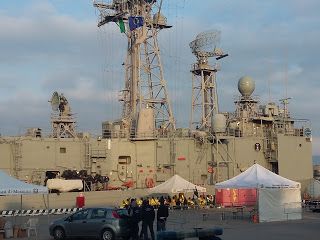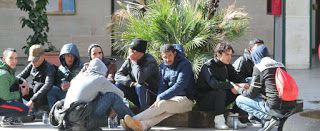Landing at Messina on March 22, and the Amal Reception Centre for Minors (formerly the Liberty)
On March 22nd we assisted with a landing at Messina which brought the number of people to have arrived in the city since January up to 1,269. The landing, carried out by the Spanish ship Canarias (EUNAVFOR-MED), involved 636 people, including some women and children. The pre-identification operations and consequent transferrals from the port to the former barracks at Bisconte were interrupted by the police at around 6pm, leaving at least 200 people on board, who were forced to sleep in the open air on deck, with only thermal blankets for cover.

The Canarias in port at Messina
Since the start of 2017, around 22,000 people have arrived by sea and, even if there have been important increases in February, according to statistics from the Department for Civil Liberty and Immigration, the numbers for these past 3 months maintain the tendency of 2016. As far as minors are concerned, again the numbers in 2017 do not break from those of the previous year: since January, 2,293 minors have arrived on our coasts, without therefore the huge increase which characterised 2016, when the total of arriving minors reached 25,846 (in comparison with 12,360 in 2015).
The issue of unaccompanied foreign minors, despite the recent approval of a new law which should organise the situation in a more smoother fashion, nonetheless, continues to be treated without appropriate instruments by authorities and the reception system in general. The Guarantor for Childhood and Adolescence recently visited some of the reception centres in southern Italy, critically reporting “imbalanced procedures, lack of places, lack of integration.” We await the full and detailed report of the various sites visited.
The Initial Reception Centre, Amal.
While the landing operations were coming to an end, we visited the Amal centre, the former Liberty hotel, converted a couple of years ago into an Initial Reception Centre for minors.* The centre was in the process of being organised to host 22 young men who were arriving with the Spanish ship and, despite the staff being busy with the preparations, the centre’s director was very open, allowing us to visit the complex along with one of the two workers.
As we have said, the building is a former hotel, located near the train station and therefore in a very central position. The structure is in an excellent state, and the rooms which we were able to visit seemed well looked after. The large number of spacious rooms, spread across three floors, allow for a dignified organisation of the guests, who sleep in rooms of 3-4 people, each room having its own bathroom. The communal spaces are also well looked after and spacious, as one might expect from a building which until some years ago was the setting of a four star hotel.
The staff consist of six educators, two psychologists, two workers, two mediators and one doctor, who is present in the structure twice a week. The legal assistant makes regular visits but is not a permanent member of the centre. The unaccompanied minors present receive their pocket money regularly, and the distribution of meals is entrusted to an external catering company, which refers to the plans drawn up by the Provincial Health Service* in preparing the menu. Italian courses of various levels are organised inside the structure, and the workers also organise a series of recreational activities for the residents.
We were able to speak with a range of the residents both in the centre and in the park opposite the station where many of them pass their time. They described it as having a positive atmosphere, confirming the impression and information which we had gained up till that point from the staff.
From Hotel to Old People’s Home to Centre for Minors
Despite the positive impressions, there were also certain problems, ones which do not relate exclusively to the Amal centre, but to the wider – and by now structural – approach of the reception system for minors in the city.
First of all, the Amal centre managed by the social cooperative Liberty Non-Profit, has taken on reception activities following the urgent public ordinance laid out by Mayor Accorinti. The ordinance was made in April 2016 to deal with the arrival of minors and overcome the blockage at the Ahmed centre, where 200 minors were being hosted in a structure authorised for only 60 people. The Liberty therefore still has no official accreditation in accordance with the standards provided for in the Regional decree 600/214, but is instead still licensed as a home for the elderly. In fact, after the failure of the hotel (which was owned by Gruppo Franza, a company which owns luxury structures across Sicily) the cooperative asked the region authority for accreditation of the former hotel in order to host and assist 80 elderly persons. Accorinti’s announcement, and the decision to change activity, came later. The cooperative nonetheless has begun the proceedings for accreditation according to DPRS 600/2014 (as above), and while waiting for a decision from the regional authority can legally operate as a reception centre.
What needs to be emphasised, however, is the emergency approach taken by the Messina city council towards reception in general, and for minors in particular. The continuing emergency, in fact, creates confusing and unclear situations, when in reality there ought be possible to plan the reception system in a structured and smooth fashion, instead of running in the wake of the landings, the numbers of which are by now entirely predictable. Unfortunately, the entire Italian reception system moves around this axis of emergency, and Messina provides a good example of an approach which should be pushed aside in order to guarantee migrants’ rights and dignity.
The number of residents and the waiting period
Among other aspects, the DPRS 600/2014, in describing the necessary standards for initial reception centres for minors (the kind of centre for which the cooperative has asked accreditation), establishes that “the structure cannot host more than 60 guests in total at the same time” and that no one should remain there for more than 3 months.
These two fundamental criteria, provided for by regional regulations precisely in order to impose a limit on the length of time spent in initial reception, and thus to speed up transferrals to “second reception” centres, are clearly breached at the Amal centre, as in so many others. The former hotel, according to the operator, can host up to 120 people – and according to some of the residents, the recent arrivals will put the number of minors in the centre up to 133. Even if we have said that the building is in excellent condition, it seems difficult for a team of this kind to follow each single case with the necessary attention, when confronted with numbers of this kind.
Furthermore, transferrals to other structures capable of a holistic reception, and individualised programmes of integration never occur within the 3 months as established by law. This happens almost always around 6 months, but we also spoke to young men present in the centre for 10 and even 12 months. These are extremely long waiting times, above all for structures which are meant to be for very initial reception. The consequence is difficulty in organising placings for the minors in school and in educational/professional courses.
The waiting times depend for the most part on the slow pace of bureaucracy, both in the naming of legal guardians and in hearing the request for international protection. At the Amal centre, for example, only some of the minors have a legal guardian, while those to whom one has been assigned have rarely met them.
Some of the minors therefore risk turning 18 without having gone through the steps necessary to receive a permit to stay, compromising their program of social inclusion, and their passage into centres of “secondary reception.” This is one of the biggest fears expressed by the young men we spoke to given that the practice in Messina means that minors who turn 18 and have still not been heard by the Territorial Commission are automatically transferred to the former “Gasparro” barracks. Many of the young men hosted at the Amal centre who arrived in Italy in 2016 explained to us that, immediately upon arrival, they spent 3 weeks or even a month at the Pala Nebiolo stadium, and then at least one month at the former barracks at Bisconte, only getting to the Liberty after this. The residents remember the situation at the former barracks well, and are scared of having to go back there. They know all too well that this is a very real possibility, given that many of their friends were sent back there upon turning 18.
It is like an obstacle course where, if you do not manage to overcome the administrative and bureaucratic adversities you risk going backwards, first and foremost in the process of social integration, and all the while sacrificing important years in these young people’s lives in terms of their growth, development and insertion into Italian society.
What is more, working to shorten these waiting times, towards the naming of legal guardians, and the consequent activation of the procedures for obtaining a permit to stay on the basis of being a minor, or for international protection, is fundamental in order to put a halt to the continuing phenomenon of minors running away from the centres and being lost across the country, putting themselves at risk of falling into cycles of exploitation in which their rights are violated. This is a very real emergency which needs to be dealt with immediately, given that according to the latest data from the Ministry of Labour and Social Policy, 5,373 minors have already disappeared into thin air.
Leaving the emergency approach behind
A few days ago, Mayor Accorinti provided some press statements following a meeting with Prefect Morcone, a meeting which the Mayor requested in order to express the administration’s opposition to the idea of transforming the former barracks into a regional ‘Hotspot’. The city council, the Mayor stated, “brought up the bad model of reception which the Hotspots establish, the negative consequences of which are visible to everyone. Large numbers of people inevitably stuck in the centres, deprived of their personal freedoms, as well as further trauma for people who have already gone through physical and psychological violence. As far as reception is concerned, the city administration is, instead, wedded to the idea of investing more in the central SPRAR service.*” Without wanting to confuse the Hotspot approach with the reception system this article has focused on, the Mayor’s words nonetheless seem important as an open expression of opposition to the emergency approach which the city council has relied upon until now. The only method able to provide real dignity to people hosted here, and to avoid serious violations of their rights, in particular those of unaccompanied foreign minors, is to leave behind the emergency ordinances, and embrace a structured and well-planned approach.
Nicolas Liuzzi
Borderline Sicilia
Project “OpenEurope” – Oxfam Italia, Diaconia Valdese, Borderline Sicilia Onlus
* Initial Reception Centre = Centro di Prima Accoglienza
* Provincial Health Service = Azienda Sanitaria Provinciale
* SPRAR = Sistema di protezione per richiedenti asilo e rifuigiati (Protection system for asylum seekers and refugees)
Translation by Richard Braude




